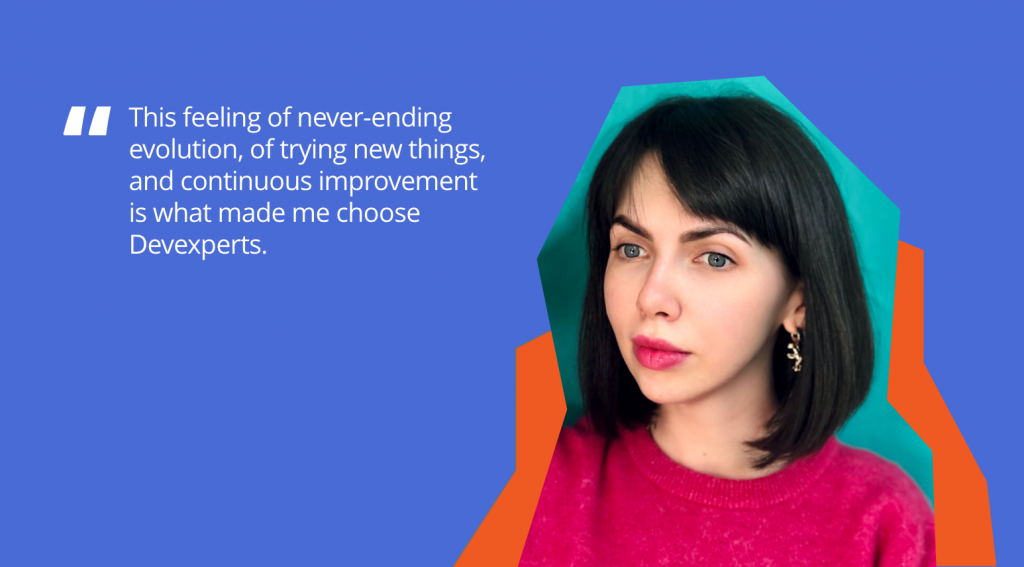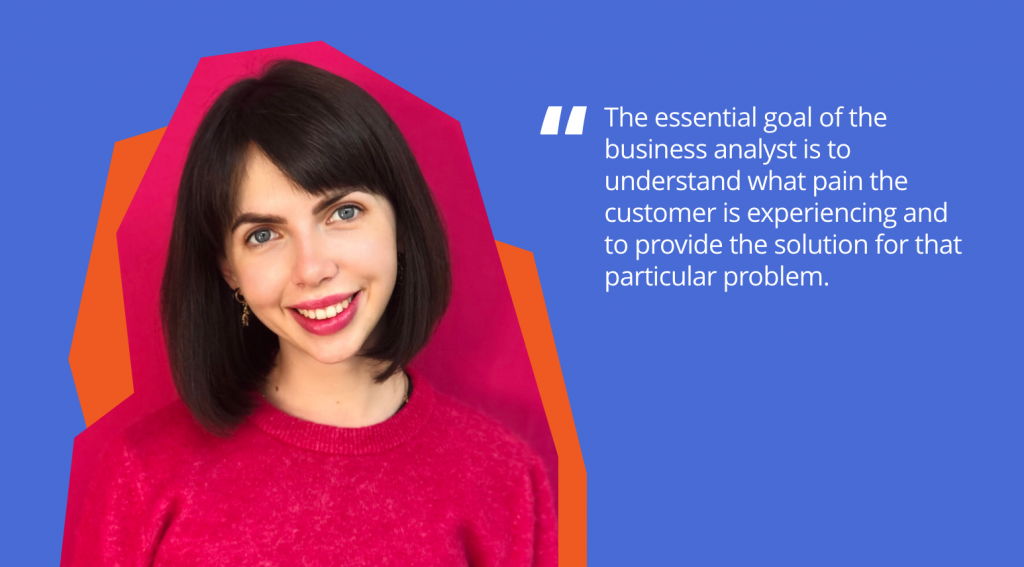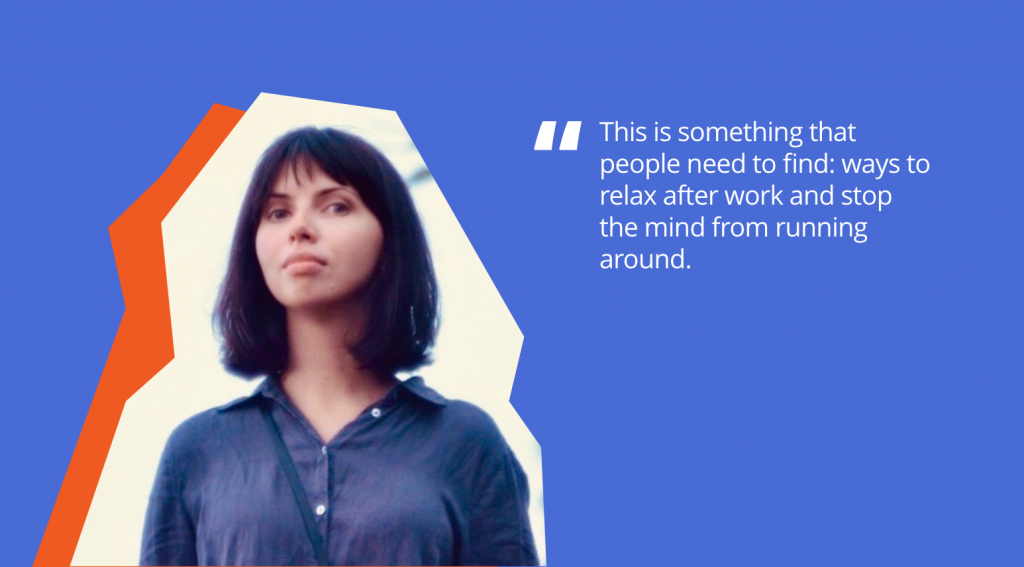Interview with Anastasia, Business Analyst
For the latest edition of dxSpotlight, we welcome Anastasia, a business analyst based in our Porto office. She takes us on an insightful exploration of her work and career as a business analyst, her life choices, and the importance of asking the question “why” in her job.

If you could describe your job as a business analyst, how would you do it?
A masterpiece of asking the question “why?”. This is an important skill to have as a business analyst.
The simplest answer is to say that I am a mediator between the customer and the developer’s team. The essential goal of the business analyst is to understand what pain the customer is experiencing and to provide the solution for that particular problem. You need to understand not only what the customer wants, but also why they want it.
Where would you say that your interest in this area comes from? What has drawn you to this field?
I think I was cursed when I was born to be a business analyst. I was born to make painful questions that no one has the answers to. I kid but the truth is that to be a business analyst you need to be a bit of a nerd as well, which I proudly consider myself to be.
I had no idea about this profession in my teenage years. Back then, my dream was to be a journalist. At the time I got some experience working on the school newspaper and later the local magazine of my hometown. When the time arrived to think about University, I thought about my career choices with a little bit of help from my parents. They helped me think about what other possibilities I could follow with the other skills I had.
I chose Business Informatics in Economy as a specialization and got in despite several obstacles that come with growing up in a small town with a limited informatics school program.
I like to think that my journalist background helps me to write less boring technical documentation that is easier to read.
Can you tell me the difference between a business analyst and a functional analyst?
Long story short, the business analyst is supposed to know more about the business domain, and the functional analyst is expected to know more about how the system works. Both should have different abilities, but the object of their work is still the same: the system.
I would like to add that even though these standards exist and are important, real life happens and boundaries get blurred. This happens all the time with job positions for these fields that end up not corresponding to what the job title implies.
Are there any specific challenges in being a BA in the Fintech world?
Yes, there are. Fintech is far from boring, especially the kind we work on which is trading. This feeling of never-ending evolution, of trying new things, and continuous improvement is what made me choose Devexperts.
I have been working here for 4 years already and I don’t even see the horizon on when this job is going to be boring. There are still a lot of things that can be learned, ongoing innovation is a given in this industry and I am always seeing different clients wanting different things. This is something that makes me happy because I feel that I am growing each day and that I am not intellectually stagnated.

For someone working as a business analyst, what do you think are the next career steps? What can a BA grow into further in their career?
There is always vertical growth and horizontal growth. With vertical, it depends on their structure and hierarchy and whether you want to be a team lead, which definitely will make your life different from being an analyst and you will have more managing tasks.
The horizontal growth once again depends on the company, but normally you can grow as a product owner (if you know the business domain and products really well), you can be a project manager (your object of work shifts from the system to the project and team) or, if you are more technically proficient, you can grow into a solution architect or a system architect.
And what means professional growth to you?
Honestly, I think it is not always about growing into some other title. For me, right now, it is more about growing as an expert in the business domain and as an analyst. You have the choice to grow as an expert in business analysis.
There are international standards for the practice of business analysis which are called BABOK (Business Analysis Body of Knowledge). This is a theoretical basis that amasses years of experience in the field, all structured and delivered in a solid source of knowledge. You can become a part of the business analysts’ community, pass the exams and become a mentor to others. This is another way to grow professionally that I see people choosing more and more.

You are a part of the Devexperts’ IT Brain Battle club, a quiz game based on the Russian TV show “What? Where? When?”. What excites you about this sort of challenge?
It’s a cool way to spend an evening with your colleagues. On one hand, you have this competitive team-building activity and on the other, there is always something new you can learn with each match.
This sort of intellectual quizzes is really perfect for a nerd, I guess!
What made you decide to choose Porto for a living and how has your experience in the city been?
When I graduated from university, I decided that moving abroad to a European country was going to be my goal. So, I started learning different languages and improving my skills in order to be able to find a job in an international company. That’s actually how I ended up in Devexperts because I searched for companies that had international structures.
And then when the opportunity to move to Porto first appeared, I applied for it even though I had never been to Portugal. When I was on Vila Nova de Gaia’s riverbank overlooking the city of Porto, I knew I had made the right choice. In the end, this blind date with the city worked out beautifully.
We know that outside work one of your biggest hobbies is drawing. What do you find to be so satisfying in this practice?
It is a bit like meditation for me. This is something that people need to find: ways to relax after work and stop the mind from running around. Drawing worked for me for a while, but I’ve switched hobbies recently and I have started to learn how to play the piano. This is something I have dreamed of since my childhood. Playing the piano is also very relaxing for me like drawing was.

What is your main driving force in life?
I guess I feel at my lowest when there is no action. So, you can imagine how I felt during the lockdown. I like to be in movement, to be in the middle of the action both physically and mentally. This probably explains what I said before about having the benefit of eternal learning in the Fintech field.
There is a side-effect to this: I have many hobbies, but I am not an expert in any of them. At some point, I need to change.
So, what is my main driving force in life? If I try to put my answer in one sentence it is: being able to act.